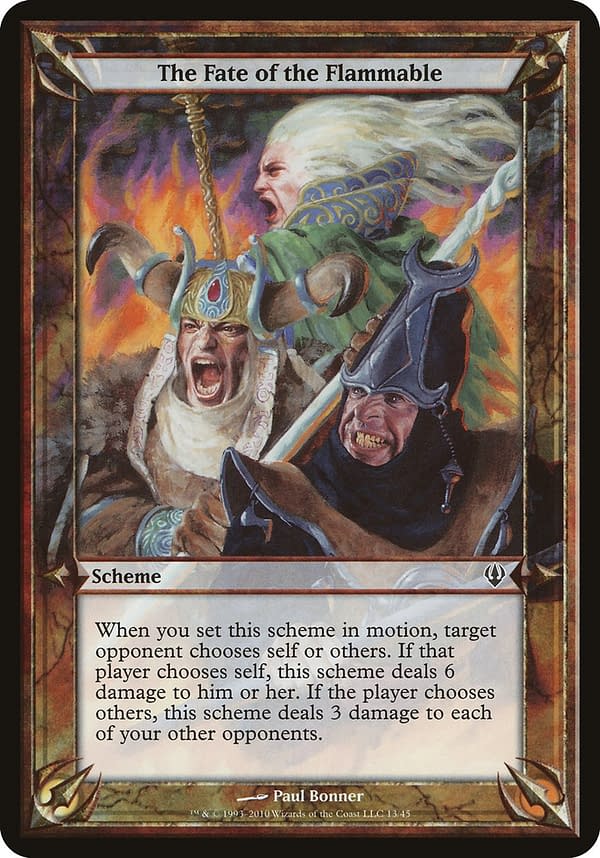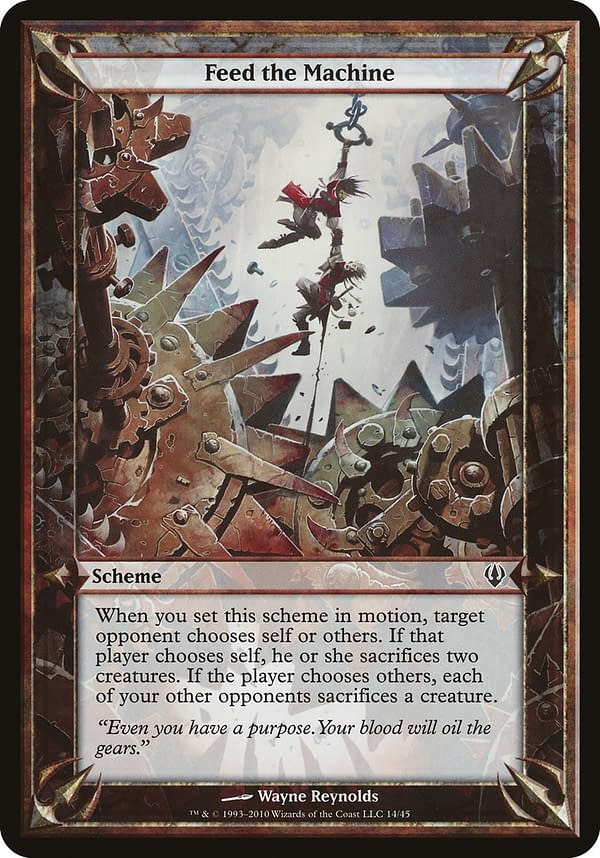Posted in: Card Games, Games, Magic: The Gathering, Tabletop, Wizards of the Coast | Tagged: Archenemy, magic, MTG, Scheme, TCG, WotC
Magic: The Gathering: Archenemy, Pt.5: How Best To Love Oneself
Hello and welcome back, all players, collectors, and other fans of Magic: The Gathering, the premier collectible trading card game designed, developed, and produced by Wizards of the Coast! We come to you today posing a new question: How best can non-Archenemy players love themselves in a game of Archenemy? After all, it's clear that the Archenemy is giving themself much self-love; perhaps there's something to that! Maybe the villain is right…

Oh no. We can't have that, now, can we? Thanks to a certain subset of scheme cards, the allied team sometimes has no choice in the matter. And it all starts by literally giving one of them a choice. Yes, you read that right. So, let's begin our analysis of two of these wonderful schemes, along with one other.
If you've been reading along with our previous four articles analyzing schemes from 2010's Archenemy preconstructed deck releases for Magic: The Gathering, you'll know the way we examine these cards, but just in case you're new, here's how we do it:
All Schemes will be grouped according to the overall role they play: These groupings are categorized as such:
Disruption: The Schemes take something from your opponents (and only them) that doesn't exist on the battlefield. This could be cards in hand, life, or choices like the ability to attack or cast spells.
Global: These Schemes impact each player with less disparity than the other Schemes in the game. Usually there will be an even effect for each player including the archenemy and/or their opponents, for a certain duration or instantaneously.
Removal: These Schemes remove opponents' permanents from the battlefield. These are rather self-explanatory, but could include the need for an opponent to make a tough decision.
Tempo: These Schemes give you as the archenemy (and only you) some sort of expedited value, such as ramp, cards drawn, or even an extra turn, to name a few examples.
Value: These Schemes give you as the archenemy (and only you) something such as tokens or cards put onto the battlefield, to name a few resources potentially granted this way. This does not include resources such as sources of mana or drawn cards, however.Next, the Schemes will be grouped further on a scale of 1-10 in terms of how well they do their job in the role provided, with 1 being rather underpowered and 10 being broken.
(For example, All In Good Time is a 9/10 for a Tempo Scheme, while Approach My Molten Realm is a 3/10 for a Global Scheme.)
With that, let's get to it!
#13. The Fate of the Flammable
The Fate of the Flammable (Disruption, 4/10) is a fairly straightforward scheme that deals with the mechanic of "Self versus Others." It gives one of your opponents a choice: Either they take six damage, or the scheme deals three damage to every one of their allies. In a game where the allied players start out with 20 life apiece, this is fine, and we would rate it higher if that was the primary type of casual game people were playing lately. However, the truth is that Commander is so popular that that probably doesn't entirely hold true anymore. And in Archenemy Commander, when allied players would be at 40 life (and not a point less without much protesting), this scheme just doesn't make the cut.

#14. Feed the Machine
Feed the Machine (Removal, 5/10) is a bit more like it when compared with The Fate of the Flammable. While when life totals scale, it affects this format's supplemental cards poorly, this card doesn't care about the scaling of the format it supplements. However, it does care a ton about the scaling of the battlefield, so while it's pretty good at getting around indestructibility or hexproof/shroud effects, the issue remains that your foes have all the control with this scheme set in motion.

#15. I Bask in Your Silent Awe
I Bask in Your Silent Awe (Disruption, 9/10) is a remarkably strong Ongoing Scheme. Either it acts as a lasting Rule of Law effect, keeping your opponents from casting more than a spell apiece each turn, or it is a turn of Silence. Both of these options are tasty and could allow you as the Archenemy to set yourself up for a win while your opponents are rendered rather helpless. The fact that this scheme is ongoing really helps its case as well. Overall, a fantastic contrast to how some of these other schemes were designed and developed (see both cases above).
In the end, what helps you to love yourself in this kind of format of Magic: The Gathering games? Well, for the allies to best love themselves, it is to hurt their allies… Or at least, that's probably how the Archenemy sees it. But what do you think? What is the best form of self-care? Let us know in the comments below!













